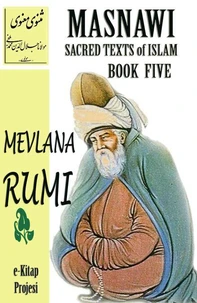O Life of the heart, Husamu-'d-Din, My zeal burnt within me to write this sixth part! The Masnavi became a standard through thy influence, Thy sword (Husam) has made it an exemplar to the world O spiritual one, I now offer it to thee, This sixth part of the entire Masnavi. Story I: The Hindu Slave who loved his Master's DaughterStory II: The Fowler and the BirdStory III: The Drunken Turkish Amir and the MinstrelStory IV: The Purchase of BilalStory V: The Sufi and the QaziStory VI: The Faqir and the Hidden TreasureStory VII: The Three TravelersStory VIII: The Man who received a Pension from the Prefect of TabrizStory IX: The King and his Three SonsThe Masnavi is divided into six books, and Rumi wrote prefaces for each book.
The earliest complete manuscript (the "Konya manuscript") was completed in December, 1278 (five years after Rumi's death).. Books 1 and 2: They "are principally concerned with the nafs, the lower carnal self, and its self-deception and evil tendencies.". Books 3 and 4: These books share the principal themes of Reason and Knowledge. These two themes are personified by Rumi in the Biblical and Quranic figure of the Prophet Moses..
Books 5 and 6: These last two books are joined by the universal ideal that man must deny his physical earthly existence to understand God's existence.
O Life of the heart, Husamu-'d-Din, My zeal burnt within me to write this sixth part! The Masnavi became a standard through thy influence, Thy sword (Husam) has made it an exemplar to the world O spiritual one, I now offer it to thee, This sixth part of the entire Masnavi. Story I: The Hindu Slave who loved his Master's DaughterStory II: The Fowler and the BirdStory III: The Drunken Turkish Amir and the MinstrelStory IV: The Purchase of BilalStory V: The Sufi and the QaziStory VI: The Faqir and the Hidden TreasureStory VII: The Three TravelersStory VIII: The Man who received a Pension from the Prefect of TabrizStory IX: The King and his Three SonsThe Masnavi is divided into six books, and Rumi wrote prefaces for each book.
The earliest complete manuscript (the "Konya manuscript") was completed in December, 1278 (five years after Rumi's death).. Books 1 and 2: They "are principally concerned with the nafs, the lower carnal self, and its self-deception and evil tendencies.". Books 3 and 4: These books share the principal themes of Reason and Knowledge. These two themes are personified by Rumi in the Biblical and Quranic figure of the Prophet Moses..
Books 5 and 6: These last two books are joined by the universal ideal that man must deny his physical earthly existence to understand God's existence.

 , qui est-ce ?
, qui est-ce ?